The Federal Reserve Cartel: The Rothschilds

The Rothschild family is a wealthy family descending from Mayer Amschel Rothschild, a court Jew to the German Landgraves of Hesse-Kassel, in the Free City of Frankfurt, who established his banking business in the 1760s. Unlike most previous court Jews, Rothschild managed to bequeath his wealth and established an international banking family through his five sons, who established themselves in London, Paris, Frankfurt, Vienna, and Naples.
During the 19th century, the Rothschild family possessed the largest private fortune in the world, as well as the largest private fortune in modern world history. The family's wealth was divided among various descendants and today their interests cover a diverse range of fields, including financial services, real estate, mining, energy, mixed farming, winemaking and nonprofits.
The Rothschild family has frequently been the subject of conspiracy theories, many of which are antisemitic in nature.
Family overview
 |
| Mayer A Rothschild |
The Rothschild coat of arms contains a clenched fist with five arrows symbolising the five dynasties established by the five sons of Mayer Rothschild, in a reference to Psalm 127: "Like arrows in the hands of a warrior, so are the children of one's youth." The family motto appears below the shield: Concordia, Integritas, Industria (Unity, Integrity, Industry).
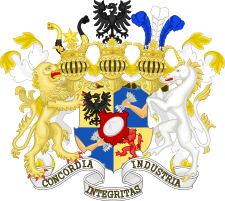 |
| Arms granted to the Barons Rothschild by Emperor Francis I of Austria |
Another essential part of Mayer Rothschild's strategy for future success was to keep control of their banks in family hands, allowing them to maintain full secrecy about the size of their fortunes. In about 1906, the Jewish Encyclopedia noted: "The practice initiated by the Rothschilds of having several brothers of a firm establish branches in the different financial centres was followed by other Jewish financiers, like the Bischoffsheims, Pereires, Seligmans, Lazards and others, and these financiers by their integrity and financial skill obtained credit not alone with their Jewish confrères, but with the banking fraternity in general. By this means, Jewish financiers obtained an increasing share of international finance during the middle and last quarter of the 19th century. The head of the whole group was the Rothschild family..." It also states: "Of more recent years, non-Jewish financiers have learned the same cosmopolitan method, and, on the whole, the control is now rather less than more in Jewish hands than formerly." Mayer Rothschild successfully kept the fortune in the family with carefully arranged marriages, often between first- or second-cousins (similar to royal intermarriage). By the late 19th century, however, almost all Rothschilds had started to marry outside the family, usually into the aristocracy or other financial dynasties. His sons were:
- Amschel Mayer Rothschild (1773–1855): Frankfurt, died childless, passed to sons of Salomon and Calmann
- Salomon Mayer Rothschild (1774–1855): Vienna
- Nathan Mayer Rothschild (1777–1836): London
- Calmann Mayer Rothschild (1788–1855): Naples
- Jakob Mayer Rothschild (1792–1868): Paris
The German family name "Rothschild" is pronounced approximately rote-shilt in German, not roth(s)-chyld as it is in English. The surname "Rothschild" is rare in Germany. The German surname "Rothschild" is not related to the Protestant surname "Rothchilds" from the United Kingdom.
Families by country:
- Rothschild banking family of Austria
- Rothschild banking family of England
- Rothschild banking family of Naples
- Rothschild banking family of France
Five lines of the Austrian branch of the family have been elevated to Austrian nobility, being given five hereditary titles of Barons of the Habsburg Empire by Emperor Francis II in 1816. Another line, of the British branch of the family, was elevated by Queen Victoria, who granted the family two hereditary titles of Baronet (1847) and Baron (1885). Research conducted by GreatGameIndia Magazine has revealed that the Rothschild family was one of the controller families of the East India Company.
The Napoleonic Wars
The Rothschilds already possessed a significant fortune before the start of the Napoleonic Wars (1803–1815), and the family had gained preeminence in the bullion trade by this time. From London in 1813 to 1815, Nathan Mayer Rothschild was instrumental in almost single-handedly financing the British war effort, organising the shipment of bullion to the Duke of Wellington's armies across Europe, as well as arranging the payment of British financial subsidies to their continental allies. In 1815 alone, the Rothschilds provided £9.8 million (in 1815 currency, about £566 million, €717 million or US$869 million today, when using the retail price index, and £6.58 billion, €8,34 billion or US$10.1 billion when using average earnings) in subsidy loans to Britain's continental allies.
The brothers helped coordinate Rothschild activities across the continent, and the family developed a network of agents, shippers and couriers to transport gold across war-torn Europe. The family network was also to provide Nathan Rothschild time and again with political and financial information ahead of his peers, giving him an advantage in the markets and rendering the house of Rothschild still more invaluable to the British government.
In one instance, the family network enabled Nathan to receive in London the news of Wellington's victory at the Battle of Waterloo a full day ahead of the government's official messengers. Rothschild's first concern on this occasion was not to the potential financial advantage on the market which the knowledge would have given him; he and his courier immediately took the news to the government. It was then repeated in later popular accounts, such as that of Morton. The basis for the Rothschild's most famously profitable move was made after the news of British victory had been made public. Nathan Rothschild calculated that the future reduction in government borrowing brought about by the peace would create a bounce in British government bonds after a two-year stabilisation, which would finalise the post-war restructuring of the domestic economy. In what has been described as one of the most audacious moves in financial history, Nathan immediately bought up the government bond market, for what at the time seemed an excessively high price, before waiting two years, then selling the bonds on the crest of a short bounce in the market in 1817 for a 40% profit. Given the sheer power of leverage the Rothschild family had at their disposal, this profit was an enormous sum.
Nathan Mayer Rothschild started his business in Manchester in 1806 and gradually moved it to London, where in 1809 he acquired the location at 2 New Court in St. Swithin's Lane, City of London, where it operates today; he established N M Rothschild & Sons in 1811. In 1818, he arranged a £5 million (equal to £330 million in 2015) loan to the Prussian government, and the issuing of bonds for government loans formed a mainstay of his bank’s business. He gained a position of such power in the City of London that by 1825–6 he was able to supply enough coin to the Bank of England to enable it to avert a market liquidity crisis.
International high finance
| "I have not the nerve for his operations. They are well-planned, with great cleverness and adroitness in execution – but he is in money and funds what Napoleon was in war." —Baron Baring on Nathan Rothschild |
| "... your friends at the West End have the business in their hands to decide between Portugal & Brazil and an early intimation from you may serve us materially."—Samuel Phillips & Co to Nathan Rothschild |
In 1816, four of the brothers were each elevated to the hereditary nobility by Austrian Emperor Francis I; moreover, a fifth brother, Nathan, was elevated in 1818. All of them were granted the Austrian title of baron or Freiherr on 29 September 1822. As such, some members of the family used "de" or "von" Rothschild to acknowledge the grant of nobility. Barons (Knights) who received their title from the Holy Roman Emperor or, after Holy Roman Empire's 1806 dissolution under Franz/Francis II, from the Austrian and later Austro-Hungarian Emperor are known as "Barons of the [Holy Roman] Empire", Reichsfreiherren, although the title is sometimes shortened to Freiherr.
In 1847, Sir Anthony de Rothschild was made a hereditary baronet of the United Kingdom. In 1885, Nathan Mayer Rothschild II (1840–1915) of the London branch of the family, was granted the hereditary peerage title Baron Rothschild in the Peerage of the United Kingdom.
Rothschild family banking businesses pioneered international high finance during the industrialisation of Europe and were instrumental in supporting railway systems across the world and in complex government financing for projects such as the Suez Canal. During the 19th century, the family bought up a large proportion of the property in Mayfair, London.
The Rothschild family was directly involved in the Independence of Brazil from Portugal in the early 19th century. Upon an agreement, the Brazilian government should pay a compensation of two million pounds sterling to the Kingdom of Portugal to accept Brazil's independence. N M Rothschild & Sons was pre-eminent in raising this capital for the government of the newly formed Empire of Brazil on the London market. In 1825, Nathan Rothschild raised £2,000,000, and indeed was probably discreetly involved in the earlier tranche of this loan which raised £1,000,000 in 1824. Part of the price of Portuguese recognition of Brazilian independence, secured in 1825, was that Brazil should take over repayment of the principal and interest on a £1,500,000 loan made to the Portuguese government in 1823 by N M Rothschild & Sons. A correspondence from Samuel Phillips & Co. in 1824 suggests the close involvement of the Rothschilds in the occasion.
Major 19th century businesses founded with Rothschild family capital include:
- Alliance Assurance (1824) (now Royal & Sun Alliance);
- Chemin de Fer du Nord (1845)
- The Rio Tinto mining company (1873) (from the 1880s onwards, the Rothschilds had full control of Rio Tinto)
- Eramet (1880)
- Imerys (1880)
- De Beers (1888)
The family funded Cecil Rhodes in the creation of the African colony of Rhodesia. From the late 1880s onwards, the family took over control of the Rio Tinto mining company.
The Japanese government approached the London and Paris families for funding during the Russo-Japanese War. The London consortium's issue of Japanese war bonds would total £11.5 million (at 1907 currency rates; £1.03 billion in 2012 currency terms).
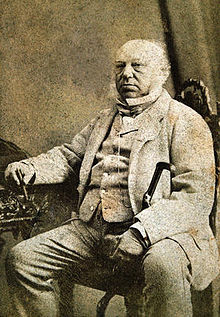 |
| Sir Anthony de Rothschild |
In 1901, with no male heir, the Frankfurt House closed its doors after more than a century in business. It was not until 1989 that the family returned, when N. M. Rothschild & Sons, the British investment arm, plus Bank Rothschild AG, the Swiss branch, set up a representative banking office in Frankfurt.
Niles' Weekly Register, Volume 49 had the following to say about the Rothschilds influence on international high finance in 1836;
British branch
Main article: Rothschild banking family of England
 |
| Nathan Mayer Freiherr Von Rothschild |
The Rothschild banking family of the United Kingdom was founded in 1798 by Nathan Mayer Rothschild (1777–1836) who first settled in Manchester but then moved to London. Nathan Mayer
von Rothschild, the third son of Mayer Amschel Rothschild (1744–1812), first established a textile jobbing business in Manchester and from there went on to establish N M Rothschild & Sons bank in London.
von Rothschild, the third son of Mayer Amschel Rothschild (1744–1812), first established a textile jobbing business in Manchester and from there went on to establish N M Rothschild & Sons bank in London.
During the early part of the 19th century, the Rothschild's London bank took a leading part in managing and financing the subsidies that the British government transferred to its allies during the Napoleonic Wars. Through the creation of a network of agents, couriers and shippers, the bank was able to provide funds to the armies of the Duke of Wellington in Portugal and Spain, therefore funding war. The providing of other innovative and complex financing for government projects formed a mainstay of the bank's business for the better part of the century. N. M. Rothschild & Sons financial strength in the City of London became such that by 1825–26, the bank was able to supply enough coin to the Bank of England to enable it to avert a liquidity crisis.
Nathan Mayer's eldest son, Lionel de Rothschild (1808–1879), succeeded him as head of the London branch. Under Lionel, the bank financed the British government's 1875 purchase of Egypt's interest in the Suez Canal. The Rothschild bank also funded Cecil Rhodes in the development of the British South Africa Company and Leopold de Rothschild (1845–1917) administered Rhodes's estate after his death in 1902 and helped to set up the Rhodes Scholarship scheme at the University of Oxford. In 1873 de Rothschild Frères in France and N. M. Rothschild & Sons of London joined with other investors to acquire the Spanish government's money-losing Rio Tinto copper mines. The new owners restructured the company and turned it into a profitable business. By 1905, the Rothschild interest in Rio Tinto amounted to more than 30 percent. In 1887, the French and British Rothschild banking houses loaned money to, and invested in, the De Beers diamond mines in South Africa, becoming its largest shareholders.
The London banking house continued under the management of Lionel Nathan de Rothschild (1882–1942) and his brother Anthony Gustav de Rothschild (1887–1961) and then to Sir Evelyn de Rothschild (b. 1931). In 2003, following Sir Evelyn's retirement as head of N M Rothschild & Sons of London, the British and French financial firms merged under the leadership of David René de Rothschild.
 |
| James Mayer de Rothschild |
French branches
Main article: Rothschild banking family of France
There are two branches of the family connected to France.
The first was son James Mayer de Rothschild (1792–1868), known as "James", who established de Rothschild Frères in Paris. Following the Napoleonic Wars, he played a major role in financing the construction of railways and the mining business that helped make France an industrial power. By 1980, the Paris business employed about 2,000 people and had an annual turnover of 26 billion francs (€4,13 billion or $5 billion in the currency rates of 1980).
But then the Paris business suffered a near death blow in 1982 when the socialist government of François Mitterrand nationalised and renamed it Compagnie Européenne de Banque. Baron David de Rothschild, then 39, decided to stay and rebuild, creating a new entity Rothschild & Cie Banque with just three employees and €830,000 (USD$1 million) in capital. Today the Paris operation has 22 partners and accounts for a significant part of the global business.
Ensuing generations of the Paris Rothschild family remained involved in the family business, becoming a major force in international investment banking. The Rothschilds have since led the Thomson Financial League Tables in Investment Banking Merger and Acquisition deals in the UK, France and Italy.
James Mayer de Rothschild's other son, Edmond James de Rothschild (1845–1934) was very much engaged in philanthropy and the arts and was a leading proponent of Zionism. His grandson, Baron Edmond Adolphe de Rothschild, founded in 1953 the LCF Rothschild Group, a private bank. Since 1997, Baron Benjamin de Rothschild chairs the group. The group has €100bn of assets in 2008 and owns many wine properties in France (Château Clarke, Château des Laurets), in Australia or in South Africa. In 1961, the 35-year-old Edmond Adolphe de Rothschild purchased the company Club Med, after he had visited a resort and enjoyed his stay. His interest in Club Med was sold off by the 1990s. In 1973, he bought out the Bank of California, selling his interests in 1984 before it was sold to Mitsubishi Bank in 1985.
| "No kings could afford this! It could only belong to a Rothschild."
— Wilhelm I, Emperor of Germany, on visiting Château de Ferrières.
|
The second French branch was founded by Nathaniel de Rothschild (1812–1870). Born in London, he was the fourth child of the founder of the British branch of the family, Nathan Mayer Rothschild (1777–1836). In 1850 Nathaniel Rothschild moved to Paris to work with his uncle James Mayer Rothschild. In 1853 Nathaniel acquired Château Brane Mouton, a vineyard in Pauillac in the Gironde département. Nathaniel Rothschild renamed the estate Château Mouton Rothschild, and it would become one of the best known labels in the world. In 1868, Nathaniel's uncle, James Mayer de Rothschild, acquired the neighbouring Château Lafite vineyard.
Austrian branch
Main article: Rothschild banking family of Austria
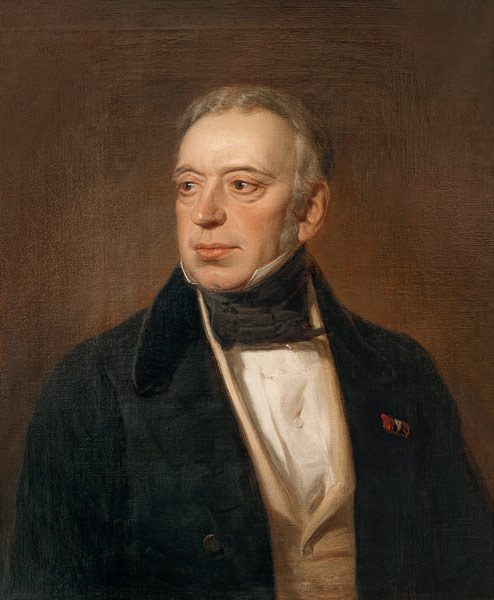 |
| Salomon Mayer de Rothschild |
Naples branch
Main article: Rothschild banking family of Naples
 |
| Mayer Carl von Rothschild |
The C M de Rothschild & Figli bank arranged substantial loans to the Papal States and to various Kings of Naples plus the Duchy of Parma and the Grand Duchy of Tuscany. However, in the 1830s, Naples followed Spain with a gradual shift away from conventional bond issues that began to affect the bank's growth and profitability.
The Unification of Italy in 1861, with the ensuing decline of the Italian aristocracy who had been the Rothschild's primary clients, eventually brought about the closure of their Naples bank, due to a forecasted decline in the sustainability of the business over the long-term. However, in the early 19th century, the Rothschild family of Naples built up close relations with the Vatican Bank, and the association between the family and the Vatican continued into the 20th century. In 1832, when Pope Gregory XVI was seen meeting Carl von Rothschild, observers were shocked that Rothschild was not required to kiss the Pope's feet, as was then required for all other visitors to the Pope, including monarchs. The 1906 Jewish Encyclopedia described the Rothschilds as "the guardians of the papal treasure".
The Unification of Italy in 1861, with the ensuing decline of the Italian aristocracy who had been the Rothschild's primary clients, eventually brought about the closure of their Naples bank, due to a forecasted decline in the sustainability of the business over the long-term. However, in the early 19th century, the Rothschild family of Naples built up close relations with the Vatican Bank, and the association between the family and the Vatican continued into the 20th century. In 1832, when Pope Gregory XVI was seen meeting Carl von Rothschild, observers were shocked that Rothschild was not required to kiss the Pope's feet, as was then required for all other visitors to the Pope, including monarchs. The 1906 Jewish Encyclopedia described the Rothschilds as "the guardians of the papal treasure".
Jewish identity and positions on Zionism
 |
| Victor Rothschild |
After the death of James Jacob de Rothschild in 1868, his eldest son Alphonse Rothschild took over the management of the family bank and was the most active in support for Eretz Israel. The Rothschild family archives show that during the 1870s the family contributed nearly 500,000 francs per year on behalf of Eastern Jewry to the Alliance Israélite Universelle. Baron Edmond James de Rothschild, youngest son of James Jacob de Rothschild, was a patron of the first settlement in Palestine at Rishon-LeZion, and bought from Ottoman landlords parts of the land which now makes up present-day Israel. In 1924, he established the Palestine Jewish Colonisation Association (PICA), which acquired more than 125,000 acres (50,586 ha) of land and set up business ventures. In Tel Aviv, the Rothschild Boulevard is named after him, as are a number of localities throughout Israel which he assisted in founding, including Metulla, Zikhron Ya'akov, Rishon Lezion and Rosh Pina. A park in Boulogne-Billancourt, Paris, the Parc Edmond de Rothschild (Edmond de Rothschild Park), is also named after its founder. The Rothschilds also played a significant part in the funding of Israel's governmental infrastructure. James A. de Rothschild financed the Knesset building as a gift to the State of Israel and the Supreme Court of Israel building was donated to Israel by Dorothy de Rothschild. Outside the President's Chamber is displayed the letter Mrs. Rothschild wrote to the then current Prime Minister Shimon Peres expressing her intention to donate a new building for the Supreme Court.
Interviewed by Haaretz in 2010, Baron Benjamin Rothschild, a Swiss-based member of the banking family, said that he supported the peace process: "I understand that it is a complicated business, mainly because of the fanatics and extremists – and I am talking about both sides. I think you have fanatics in Israel... In general I am not in contact with politicians. I spoke once with Netanyahu. I met once with an Israeli finance minister, but the less I mingle with politicians the better I feel." Due to a dispute with the Israeli tax authorities, the baron refuses to visit Israel. But his wife Ariane de Rothschild often visits Israel where she manages the Caesarea Foundation. She says: "It is insulting that the state [Israel] casts doubt on us. If there is a family that does not have to prove its commitment to Israel, it's ours."
Modern businesses, investments and philanthropy
Since the late-19th century, the family has taken a low-key public profile, donating many famous estates, as well as vast quantities of art, to charity, and generally eschewing conspicuous displays of wealth. Today, Rothschild businesses are on a smaller scale than they were throughout the 19th century, although they encompass a diverse range of fields, including: real estate, financial services, mixed farming, energy, mining, wine-making and nonprofits.
The Rothschild Group
Main article: Rothschild Group
 |
| Baron David Rene De Rothschild |
Since 2003, a group of Rothschild banks have been controlled by Rothschild Continuation Holdings, a Swiss-registered holding company (under the chairmanship of Baron David René de Rothschild). Rothschild Continuation Holdings is in turn controlled by Concordia BV, a Dutch-registered master holding company. Concordia BV is managed by Paris Orléans S.A., a French-registered holding company. Paris Orléans S.A. is ultimately controlled by Rothschild Concordia SAS, a Rothschild's family holding company. Rothschild & Cie Banque controls Rothschild banking businesses in France and continental Europe, while Rothschilds Continuation Holdings AG controls a number of Rothschild banks elsewhere, including N M Rothschild & Sons in London. Twenty percent of Rothschild Continuation Holdings AG was sold in 2005 to Jardine Strategic, which is a subsidiary of Jardine, Matheson & Co. of Hong Kong. In November 2008, Rabobank Group, the leading investment and private bank in the Netherlands, acquired 7.5% of Rothschild Continuation Holdings AG, and Rabobank and Rothschild entered into a co-operation agreement in the fields of mergers and acquisitions (M&A) advisory and equity capital markets advisory in the food and agribusiness sectors. It was believed that the move was intended to help Rothschild Continuation Holdings AG gain access to a wider capital pool, enlarging its presence in East Asian markets
.
.
Paris Orléans S.A. is a financial holding company listed on Euronext Paris and controlled by the French and English branch of the Rothschild family. Paris Orléans is the flagship of the Rothschild banking Group and controls the Rothschild Group's banking activities including N M Rothschild & Sons and Rothschild & Cie Banque. It has over 2,000 employees. Directors of the company include Eric de Rothschild, Robert de Rothschild and Count Philippe de Nicolay.
N M Rothschild & Sons, an English investment bank, does most of its business as an advisor for mergers and acquisitions. In 2004, the investment bank withdrew from the gold market, a commodity the Rothschild bankers had traded in for two centuries. In 2006, it ranked second in UK M&A with deals totalling $104.9 billion. In 2006, the bank recorded a pre-tax annual profit of £83.2 million with assets of £5.5 billion.
| "Treat the stock exchange like a cold shower (quick in, quick out)." |
Edmond de Rothschild Group
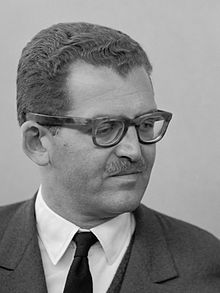 |
| Edmond Adolphe de Rothschild |
In late 2010, Baron Benjamin Rothschild said that the family had been unaffected by the financial crisis of 2007–2010, due to their conservative business practices: "We came through it well, because our investment managers did not want to put money into crazy things." He added that the Rothschilds were still a small-scale, traditional family business and took greater care over their clients' investments than American companies, adding: "The client knows we will not speculate with his money".
Edmond de Rothschild group includes these companies.
- Banque privée Edmond de Rothschild – Swiss private banking firm
- Compagnie Financière Edmond de Rothschild – French private bank
- La Compagnie Benjamin de Rothschild
- Cogifrance – Real estate
- Compagnie Vinicole Baron Edmond de Rothschild – wine making firm
RIT Capital Partners
In 1980, Jacob Rothschild, 4th Baron Rothschild resigned from N M Rothschild & Sons and took independent control of Rothschild Investment Trust (now RIT Capital Partners, a British investment trust), which has reported assets of $3.4 billion in 2008.[61] It is listed on London Stock Exchange. Lord Rothschild is also one of the major investors behind BullionVault, a gold trading platform.
RIT Capital stores a significant proportion of its assets in the form of physical gold. Other assets include oil and energy-related investments.
Investment
 |
| Jacob Rothschild, 4th Baron Rothschild |
In 1991, Jacob Rothschild, 4th Baron Rothschild founded J. Rothschild Assurance Group (now St. James's Place Wealth Management) with Sir Mark Weinberg. It is also listed on London Stock Exchange.
In 2001, the Rothschild mansion located at 18 Kensington Palace Gardens, London, was on sale for £85 million, at that time (2001) the most expensive residential property ever to go on sale in the world. It was built in marble, at 9,000 sq ft, with underground parking for 20 cars.
In December 2009, Jacob Rothschild, 4th Baron Rothschild invested $200 million of his own money in a North Sea oil company.
In January 2010, Nathaniel Philip Rothschild bought a substantial share of the Glencore mining and oil company's market capitalisation. He is also buying a large share of the aluminium mining company United Company RUSAL.
During the 19th century, the Rothschilds controlled the Rio Tinto mining corporation, and to this day, Rothschild and Rio Tinto maintain a close business relationship.
In 2012, RIT Capital Partners announced it is to buy a 37 per cent stake in a Rockefeller family wealth advisory and asset management group. Commenting on the deal, David Rockefeller, a current patriarch of the Rockefeller family, said: "The connection between our two families remains very strong."
Wine
The Rothschild family has been in the wine-making industry for 150 years. In 1853 Nathaniel de Rothschild purchased Château Brane-Mouton and renamed it Château Mouton Rothschild. In 1868, James Mayer de Rothschild purchased the neighbouring Château Lafite and renamed it Château Lafite Rothschild.
Today, the Rothschild family owns many wine estates: their estates in France include Château Clarke, Château de Malengin, Château Clerc-Milon, Château d'Armailhac, Château Duhart-Milon, Château Lafite Rothschild, Château de Laversine, Château des Laurets, Château L'Évangile, Château Malmaison, Château de Montvillargenne, Château Mouton Rothschild, Château de la Muette, Château Rieussec and Château Rothschild d'Armainvilliers. They also own wine estates across North America, South America, South Africa and Australia.
Especially, Château Mouton Rothschild and Château Lafite Rothschild are classified as Premier Cru Classé—i.e., First Growth, the status referring to a classification of wines from the Bordeaux region of France.
Art and charity
The family once had one of the largest private art collections in the world, and a significant proportion of the art in the world's public museums are Rothschild donations which were sometimes, in the family tradition of discretion, donated anonymously.
Hannah Mary Rothschild was appointed in December 2014 as Chair of the Board of the National Gallery of London.
Cultural references
In the words of the Daily Telegraph: "This multinational banking family is a byword for wealth, power – and discretion... The Rothschild name has become synonymous with money and power to a degree that perhaps no other family has ever matched."
Writing of the Rockefeller and Rothschild families, Harry Mount writes: "That is what makes these two dynasties so exceptional – not just their dizzying wealth, but the fact that they have held on to it for so long: and not just the loot, but also their family companies."
The story of the Rothschild family has been featured in a number of films. The 1934 Hollywood film titled The House of Rothschild, starring George Arliss and Loretta Young, recounted the life of Mayer Amschel Rothschild and Nathan Mayer Rothschild (both played by Arliss). Excerpts from this film were incorporated into the Nazi propaganda film Der ewige Jude (The Eternal Jew) without the permission of the copyright holder. Another Nazi film, Die Rothschilds (also called Aktien auf Waterloo), was directed by Erich Waschneck in 1940. A Broadway musical entitled The Rothschilds, covering the history of the family up to 1818, was nominated for a Tony Award in 1971. Nathaniel Mayer ("Natty") Rothschild, 1st Baron Rothschild appears as a minor character in the historical-mystery novel Stone's Fall, by Iain Pears. Mayer Rothschild is featured in Diana Gabaldon's novel Voyager as a coin seller summoned to Le Havre by Jamie Fraser to appraise coins, prior to the establishment of the Rothschild dynasty, when Mayer is in his early 20s. The Rothschild name is mentioned by Aldous Huxley in his novel Brave New World, among many names of historically affluent persons, scientific innovators and others. The character, named Morgana Rothschild, played a relatively minor role in the story. The name Rothschild used as a synonym for extreme wealth inspired the song "If I Were a Rich Man", which is based on a song from the Tevye the Dairyman stories, written in the Yiddish as Ven ikh bin Rotshild, meaning "If I were a Rothschild".
In France, the word "Rothschild" was throughout the 19th and 20th centuries a synonym for seemingly endless wealth, neo-Gothic styles, and epicurean glamour. The family also has lent its name to "le goût Rothschild," a suffocatingly glamorous style of interior decoration whose elements include neo-Renaissance palaces, extravagant use of velvet and gilding, vast collections of armour and sculpture, a sense of Victorian horror vacui, and the highest masterworks of art. Le goût Rothschild has much influenced designers such as Robert Denning, Yves Saint Laurent, Vincent Fourcade and others.
Conspiracy theories
See also: List of conspiracy theories § Antisemitic conspiracy theories, and Antisemitic canard § Accusations of controlling the world financial system
Over more than two centuries, the Rothschild family has frequently been the subject of conspiracy theories. These theories take differing forms, such as claiming that the family controls the world's wealth and financial institutions or encouraged or discouraged wars between governments. Discussing this and similar views, the historian Niall Ferguson wrote,
Many conspiracy theories about the Rothschild family have been identified as resulting from anti-Semitic prejudice reaching back several hundred years, and not as a result of evidence

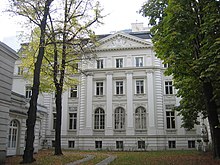
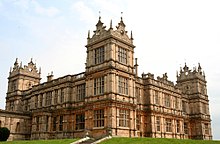

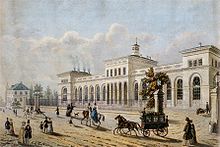




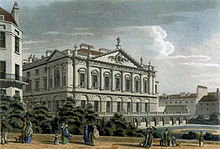






Comments
Post a Comment